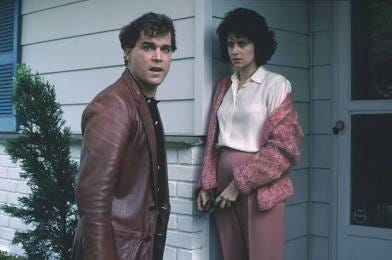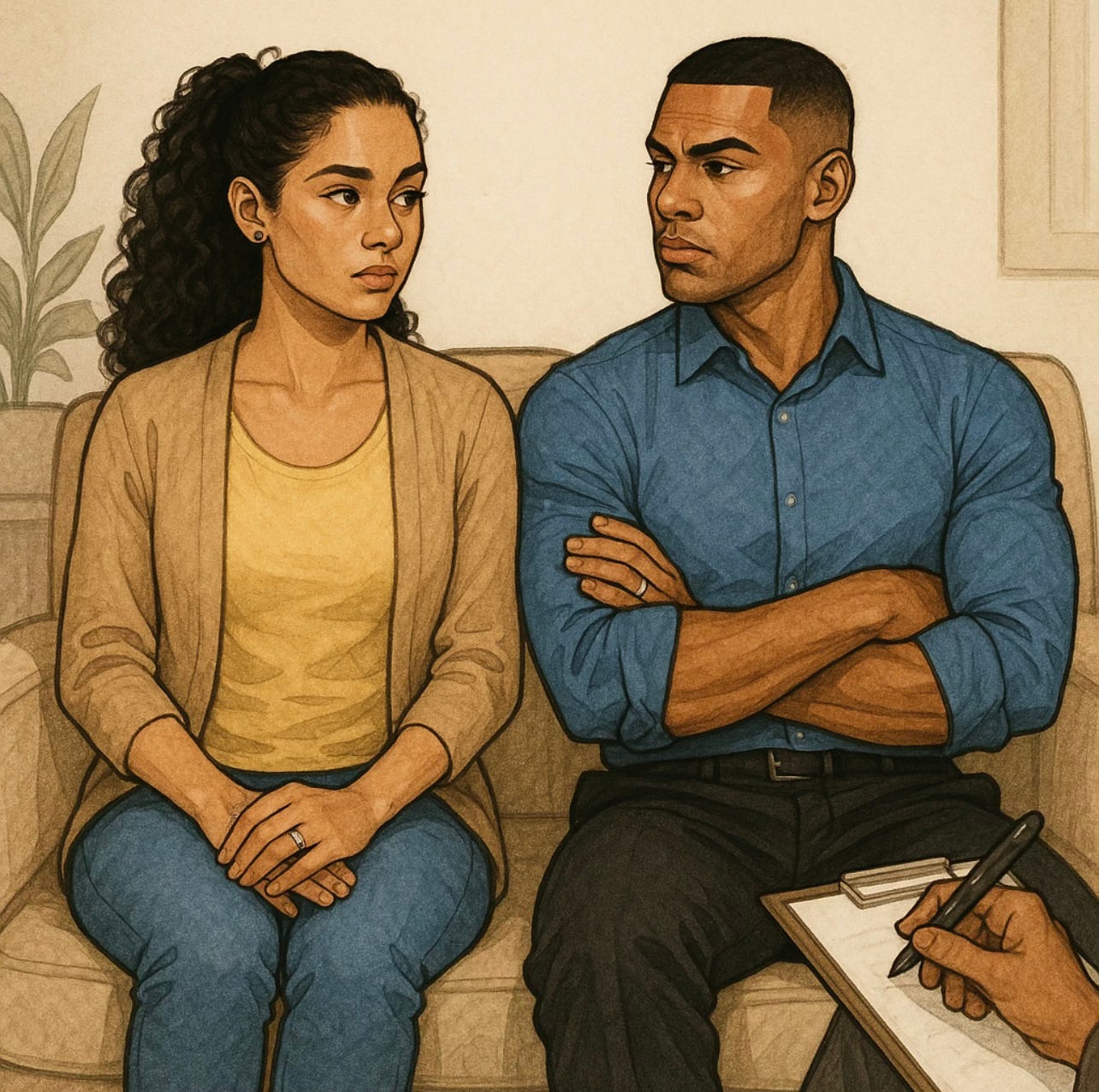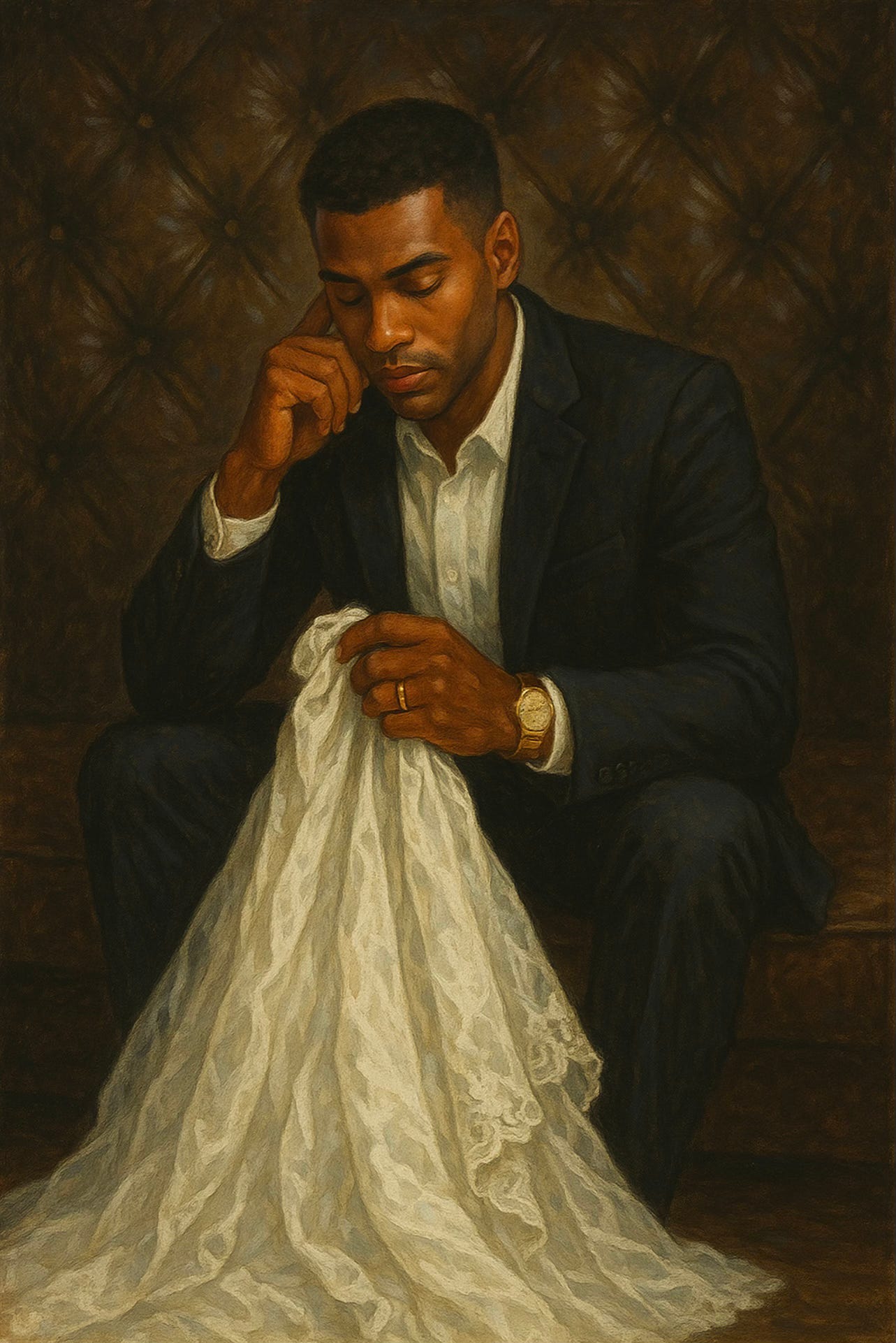My husband once told me, back when we were just kids, that violence is sometimes necessary.
I should’ve run for the hills when he said it.
It reminded me of that scene in Goodfellas, when Henry Hill beat the hell out of the guy who tried to force himself on Karen. He used the butt of his gun. Gave it to her after, still warm. She said she should’ve been scared. She should’ve walked away.
But she didn’t.
Neither did I.
Domingo was sixteen when I saw the blood on his shirt. A deep red blotch, half-dried, right beneath the collar. I remember the moment as if it were a photograph. It was late May, almost summer, and I was in New York for one of my weekend visits to my grandmother’s house. That was tradition. I was from Rhode Island, but my father couldn't stay away from the city — from his mother, his sisters, his roots. So every weekend, without fail, we drove the three hours down I-95 and came back Sunday night. Holidays were sacred. We never missed one.
That weekend, my parents were out with the adults — some local lounge they all loved — and my twenty-one-year-old cousin was in charge. I was on the porch when Domingo showed up. He walked in like a shadow — quiet, steady, unreadable — just like he always did. That’s when I saw the blood.
I asked him what happened and if he was okay.
He didn’t flinch. “Don’t worry about it,” he said. “The blood isn’t mine.”
No stutter. No tremble. No worry in his voice. Just calm — too calm.
He explained it like he was talking about the weather. A group of kids from another block had jumped him a few days earlier. That day, he came prepared — a small blade tucked in his jacket. When they came at him again, he fought back. One of them got cut. Bad enough to send a message, not bad enough to end up on the news.
Domingo always talked about how things worked where he came from — how people policed themselves. Fights weren’t just common. They were expected. He once told me, “You have to check someone the first time they get out of line. If you don’t, they’ll try to play you every chance they get. So yeah… at least here, violence is necessary.”
And still, I stayed.
We kept our relationship hidden from my parents. Of course we did. I’m biracial — Dominican father, white mother — and anyone with Dominican blood knows that when your father’s from the island, he runs a tight, no-nonsense ship, especially with his daughters.
Credit to Domingo — he was a ghost. My parents never saw him. He blended in, slipped in and out of my cousins’ circle of friends so effortlessly that he was invisible. My cousins never suspected a thing — or if they did, they kept their mouths shut.
When I turned eighteen and left for college — in New York, naturally — that’s when I introduced Domingo to my parents for real. He was studying culinary arts. I was in nursing. On paper, we were the dream — discipline, ambition, direction.
And I know what you’re thinking: Long-distance relationship at sixteen? He was probably cheating.
Maybe. Maybe not. But I trusted him. Moreover, I never heard anything. Not from my cousins, not from the block. Not once. And I’m not naive. If he ever slipped, it must’ve been before I moved to New York — before we became inseparable.
The only red flag, the only thing that ever gave me pause, was that damn blood spot.
Years passed. Domingo became a chef — a real one. Talented, precise, and obsessive about the details. He leased a space, turned it into a restaurant, and turned that into the spot. If you don’t have a reservation, you don’t get in. Doesn’t matter who you are.
We got married in our late twenties. Life should’ve been good. But now we’re in our early thirties — I’m still working long, chaotic shifts as a nurse, he’s running a successful restaurant and playing the executive chef role. And somewhere between the night shifts and the late-night closes, the cracks started to show.
We don’t spend time together. And the barmaids, waitresses, and high-powered female clients in his business circles? Let’s just say temptation doesn’t exactly avoid a man like Domingo. Tall, broad-shouldered, honey-brown complexion, full lips, soft eyes. He speaks low, moves quietly, and commands a room with a look. He’s not loud, not flashy — but there’s a gravity to him.
And yet, the intimacy dried up. Weeks passed. No touch. No spark. No real conversation.
It wasn’t just me. I’ve been going out more after shifts — drinks with coworkers, late laughs in dim corners. But this isn’t about me.
It’s about him. I feel him pulling away.
And then came the second sign.
We both had the same day off — a rare occurrence — so we took a stroll on the High Line. It was early fall. Leaves turning fire-orange, clouds drifting between skyscrapers, the city glowing gold. And then this kid — maybe twenty — walking toward us says:
“Yo, what up, Culinary Chemist?”
I barely registered it before Domingo let go of my hand and squared up. Instinctively. Like he was about to throw a haymaker. He caught himself, maybe because I was watching.
The guy stammered, “My bad, my bad. Wrong person,” and backed off fast.
But I knew better.
That name — Culinary Chemist — wasn’t random. It was for him. I saw it in Domingo’s eyes. That flicker. That readiness.
I pushed him for answers. What did the name mean? Who was that guy? Why did he react like that?
He stonewalled me. Said it was nothing. Mistaken identity. But the more I pushed, the more distant he got. The less we spoke, the more we fought. And that moment — that one weird encounter — became the match that lit a fire already burning between us.
I knew he was hiding something. I didn’t know what, but I was done playing the oblivious wife. Was it another woman? Was it money? Drugs? Gambling? Something darker?
I dragged him to therapy. I gave him an ultimatum: You come with me, or we’re done.
There were so many questions I wanted to ask. Was he still in love with me? Did he still want this marriage? Why hadn’t he touched me in weeks? Was there someone else?
I had given everything to this life. Stayed in New York after school because of him. Now, I wanted to go back home to Rhode Island to continue my nursing career there. I even dreamed of him opening a second restaurant in Providence. He could manage New York from a distance, visit once a week, maybe twice. I wanted peace. Simplicity. Truth.
People say, ‘Be careful what you wish for; you might not like the result.’
I didn’t give a fuck. I wanted transparency.
There’s a difference between honesty and transparency. Ask me a hundred times, and I’ll always choose transparency.
But nothing — nothing — could have prepared me for what came next.
Domingo’s silence was never emptiness. It was storage. He’d been hiding who he really was. And when it all came to light — piece by piece, in therapy, behind closed doors, whispered confessions I had to pry from his mouth like pulling teeth — I realized something I didn’t want to admit.
There was a con in our vows.
I meant every word when I said them: For better, for worse. Richer, poorer. Sickness, health.
But can I really ride this out with a man who kept this kind of secret from me? A man whose past might not just be behind him — but who might still be in it?
A better question: Can I bring him back to the good man I still believe lives beneath all that shadow?
Or is that blood spot from when we were sixteen, the stain that never washed out?
This piece is something I put together from my upcoming third self-published novel. I tried my best not to give away any of the plot, while still making it interesting and enjoyable enough for you.





